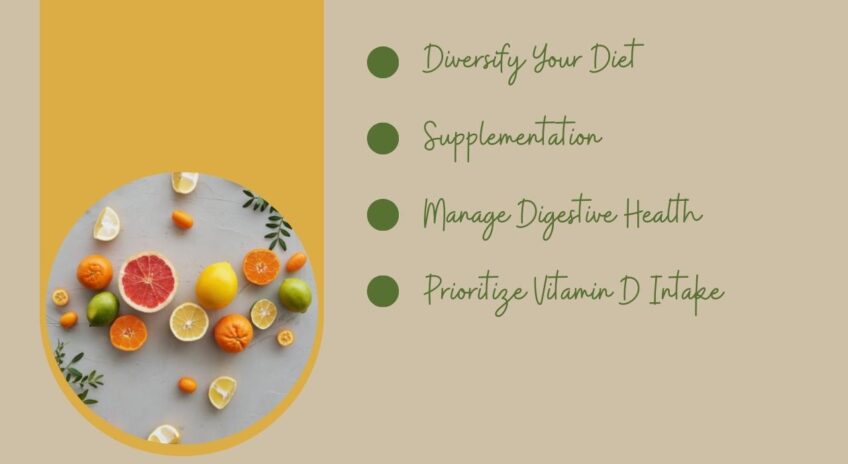We are all aware of the importance of maintaining a healthy, balanced diet for general well-being. Nutrient deficiencies, however, can develop for a number of reasons and result in a number of health issues. The first step toward implementing practical treatments that encourage vigor and longevity is understanding the underlying causes of nutrient deficiencies.
Page Contents
Common Causes of Nutrient Deficiencies

Dietary Choices and Imbalance
One of the leading causes of nutrient deficiencies is an inadequate diet. Consuming a diet that lacks variety and essential nutrients can deprive your body of the vitamins and minerals it needs to function optimally. Relying heavily on processed foods and neglecting fresh fruits, vegetables, lean proteins, and whole grains can contribute to deficiencies.
Digestive Disorders Impacting Absorption
Certain digestive disorders, such as celiac disease, inflammatory bowel disease, and leaky gut syndrome, can hinder the proper absorption of nutrients. Even if you’re consuming a nutrient-rich diet, these conditions can prevent your body from effectively absorbing and utilizing vital vitamins and minerals.
Limited Sun Exposure and Vitamin D Deficiency
Vitamin D is a crucial nutrient that plays a significant role in bone health, immune function, and overall well-being. Insufficient exposure to sunlight, especially for those living in northern latitudes, can lead to vitamin D deficiency. This deficiency is often associated with weak bones, increased susceptibility to infections, and other health complications.
Excessive Alcohol Consumption
Overindulgence in alcohol can significantly contribute to nutrient deficiencies. According to research conducted by harmonyridgerecovery.com, alcohol interferes with the absorption and utilization of essential vitamins and minerals in the body, particularly B vitamins, vitamin C, magnesium, and zinc.
Moreover, excessive alcohol consumption can lead to poor dietary choices, as alcohol often provides empty calories without significant nutritional value. Chronic alcohol use can also damage the lining of the digestive tract, further impairing nutrient absorption.
If you consume alcohol, it’s essential to do so in moderation and ensure you maintain a balanced diet rich in the nutrients that alcohol can deplete.
Effective Solutions for Nutrient Deficiencies

Diversify Your Diet
A well-rounded and diverse diet is a cornerstone of good health. To effectively combat nutrient deficiencies, aim to incorporate a vibrant array of foods into your meals. Fill your plate with an abundance of colorful fruits, ranging from antioxidant-rich berries to tropical delights like papaya and mango.
Vegetables of all hues should also play a starring role, offering a plethora of vitamins, minerals, and phytonutrients. Embrace the goodness of whole grains like quinoa, brown rice, and whole wheat, which provide sustained energy and essential nutrients.
Complement your meals with lean proteins, such as poultry, fish, legumes, and tofu, all of which contribute to muscle health and overall vitality. Don’t forget to include healthy fats from sources like avocados, nuts, and olive oil, which support heart health and aid in the absorption of fat-soluble vitamins.
Bridging the Nutritional Gap
In certain situations, achieving a perfectly balanced diet can be challenging. That’s where supplements come into play, offering a convenient solution to bridge potential nutritional gaps and help fight the causes of nutrient deficiencies.
However, it’s essential to approach supplementation with caution and guidance. Before incorporating supplements into your routine, consult a qualified healthcare professional who can assess your specific needs and recommend appropriate options.
Vitamin and mineral supplements, when used wisely, can complement your diet and help ensure your body’s requirements are met. Remember, supplements should enhance a well-rounded diet, not replace it.
Manage Digestive Health
Your body’s ability to absorb nutrients depends heavily on the integrity of your digestive system. Seeking expert medical help is essential if you believe digestive issues are preventing you from absorbing nutrients.
Any underlying issues can be accurately diagnosed by a healthcare professional, who can also provide a customized treatment plan. Taking care of digestive problems can improve your body’s capacity to absorb crucial nutrients from the food you eat, thus enhancing your overall well-being.
Prioritize Vitamin D Intake
Vitamin D, often referred to as the “sunshine vitamin,” is integral to numerous bodily functions. While spending time outdoors is an excellent way to boost your vitamin D levels naturally, doing so mindfully and with adequate sun protection is crucial.
If sunlight exposure is limited, consider enriching your diet with vitamin D-rich foods. Indulge in the goodness of fatty fish like salmon and mackerel, which not only provide omega-3 fatty acids but also contribute to your vitamin D intake. Fortified dairy products and egg yolks are also fantastic sources.
However, before embarking on a new supplement regimen, consult your healthcare provider to ensure that your vitamin D levels remain within the optimal range.
Prevention and Long-Term Well-Being

Your present well-being and the preservation of your long-term health and vigor depend on you taking proactive measures to avoid nutritional deficiencies.
You may create a life full of energy, resilience, and a solid foundation of wellness by looking closely at the reasons for these inadequacies and embracing a comprehensive strategy to address them. Whether you decide to change your diet, use supplements, or work closely with medical professionals to address underlying health concerns, your unrelenting dedication to taking care of your body resonates deeply.
It becomes a testament to your commitment to living the best life possible, one that influences every element of your mental and physical wellness from the inside out.
As you set out on this path of preventative care, you give yourself the ability to repair any deficits that may already exist and to create a future that is marked by lasting health and thriving vitality.
Nourish Your Body, Nurture Your Health
It’s simple to ignore the importance of maintaining optimal nutritional levels in a world of demanding lifestyles and busy schedules. When you are aware of the causes and treatments of nutrient deficiencies, you have the power to make decisions that will improve your health and vitality.
You prepare the path for a life full of vitality, resilience, and well-being by varying your diet, taking supplements, taking care of your digestive system, and making your vitamin D consumption a priority.
Remember that recognizing the root causes of nutrient deficiencies and adopting effective measures to address them are the first steps on your path to achieving optimal health. Accept the power of a well-balanced diet and observe how your body changes into a thriving reservoir of energy.















